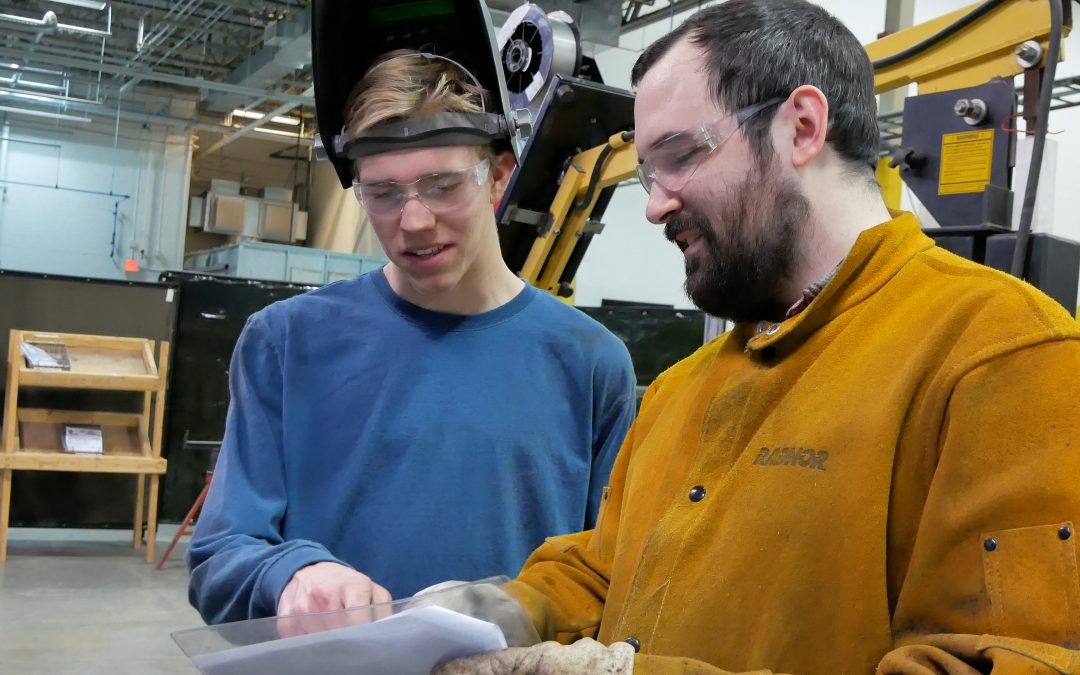
Mar 19, 2021 | Apprenticeships, Students
One of the value propositions behind Career and Technical Education (CTE) in New Hampshire is to provide hands-on learning for high school students, an objective that often involves industry partners.
“We work with industry to create real work opportunities for students,” said Rich Paiva, Career Development Coordinator at Wilbur H. Palmer CTE Center, who helped launch an internship program in welding two years ago.
This program involves Spraying Systems Co. in Merrimack.
“Before the pandemic, we had students tour their facility during Manufacturing Month in New Hampshire,” explained Paiva. “The students met the welders and were able to ask questions.”
One student, Shea Williams, found some answers.
“Between the program and the tour, he realized this was the career path for him,” said Paiva.
This realization led to a conversation with Joe Ruelas, Vice President Operations at Spraying Systems Co., and ApprenticeshipNH.
“We had to work out some details and how we could combine our program with the time spent at Spraying Systems so Shea could earn high school credits while over there,” explained Paiva.
This creative arrangement enabled the hours Williams spent in the welding program to roll over into a full apprenticeship at Spraying Systems after he graduated from school last June.
“Spraying Systems is now sending him to Manchester Community College for an Associate’s degree,” Paiva said. “It is going great.”
Ruelas agreed.
“Shea has done very well for us,” he noted. “He has willingly accepted being trained on everything. He has a good work ethic and, most importantly, works well with others. He will one day be a good welder, hopefully, for our company.”
Citing his working relationship with Paiva as a big reason why Spraying Systems Co. developed apprenticeships, Ruelas said there are several advantages to creating them.
“One is to provide students the opportunity to learn a trade or skill in manufacturing,” he explained. “The other is to create and maintain a culture at our company of passing on knowledge to less experienced people and people who strive to learn more. The last one is to help improve the community.”
As for how his apprenticeship experience has been at Spraying Systems, Williams said it “has been awesome.”
“I am able to learn lots about my chosen trade of welding,” he said. “I am also being trained how to do many other procedures in manufacturing, such as sandblasting, pressure testing, and even some machining. I enjoy the company of my coworkers, and I enjoy the work I do.”
The experience for Williams is priceless.
“The best part of the apprenticeship is being able to get up in the morning and do something that I enjoy doing and can take pride in,” he said. “Welding is something that I enjoy putting a great deal of effort into, and being given the opportunity to learn and get job experience at the same time is something I am certainly grateful for.”
According to Paiva, Williams’ experience is “a textbook example of CTE.”
“We are here to help students explore career pathways, and Shea’s experience is possible through innovative partnerships with external stakeholders and industry,” he said. “Everyone benefits with CTE.”
Wilbur H. Palmer CTE Center is one of nearly two-dozen CTE centers throughout the state of New Hampshire.
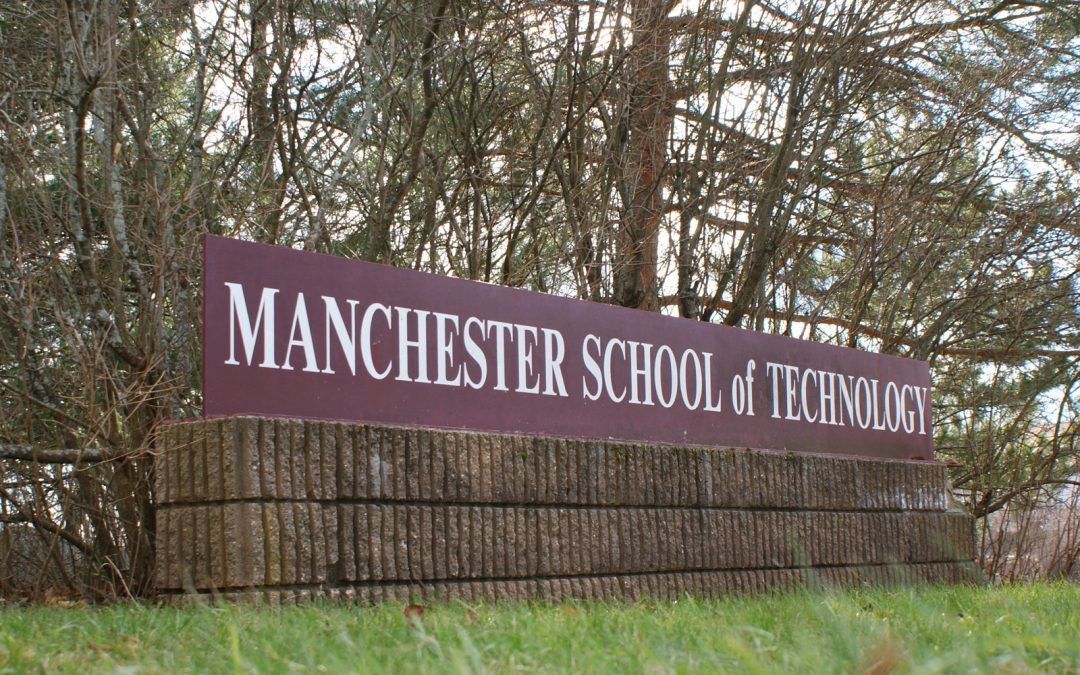
Jan 22, 2021 | Challenges and Opportunities, Impact, Leadership, Ticker
With programs ranging from culinary to marketing, biotechnology and more, Career and Technical Education (CTE) in New Hampshire provides high school students with opportunities to not only learn, but develop their knowledge in real-world settings.
“CTE is experiential career training,” explained Karen Hannigan Machado, principal of The Manchester School of Technology, one of more than two-dozen CTE centers across New Hampshire. “They train on the most up to date equipment and go out and learn in the field and job sites.”
This experiential aspect of CTE prepares high school students in measurable ways.
“They can go right into the job they prepared for in high school, or they will be further ahead in a certification or college program,” she added.
According to Jen Haskins, director of Career & Technical Education at Pinkerton Academy in Derry, CTE’s connection with — and alignment to — post-secondary education is often not understood by the general public.
“The biggest misconception people have is the level of rigor found in CTE classes statewide,” she said.
A majority of CTE classes also offer college credit and certifications in a variety of diverse industries.
“Many CTE students can graduate with six to 18 credits of college classes,” said Haskins, who also serves as president of the New Hampshire Career and Technical Administrators Association.
CTE programs are not, however, tied to specific jobs, but instead lead to “career pathways” that prepare students for a variety of different options.
“CTE puts students on trajectories that are far ahead of their peers in regards to hands-on skills and learning, all of which simulate an industry or career,” said Haskins. “CTE’s biggest value propositions include exploration, skill development, college credit and simulation-learning.”
In the Criminal Justice & Homeland Security program at Creteau Technology Center in Rochester, for example, these value propositions lead students through a deep exploration of the justice system in American society.
“They explore the question of crime causation from a number of theoretical perspectives and look at criminal law in the federal and state systems,” explained Michele Halligan-Foley, director of Career Technology Education.
In the program, students analyze essential elements of all major crimes, concepts of constitutional review and judicial scrutiny, and the principles that govern legal challenges to the constitutionality of laws.
“They also examine the causative factors in the development of youthful offenders and the development and philosophy behind treatment and rehabilitative practices,” she added.
The pandemic, however, threatens the viability of this and many CTE programs statewide, as directors navigate the logistical challenges related to providing “hands-on” learning in remote learning environments.
“It’s extremely challenging, especially for CTE students, who want the hands-on learning part,” said Vaso Partinoudi, director of Career and Technical Education, Applied Technology Center (ATC) at Milford High School.
Halligan-Foley agreed and said CTE centers statewide are losing students due to schedule changes brought about by the pandemic.
“It is going to take years to rebuild the numbers in CTE programs,” she said.
The potential impact goes well beyond education.
“The concern is how well-prepared our students will be when they try to get hired or go into training programs and college,” said Hannigan Machado. “It is very difficult to train people with only visuals.”
According to Haskins, CTE’s close connection(s) with industry partners may take on increased significance in the future.
“The relationships CTE programs have with industry is the backbone to students’ success,” she said. “These connections help guide us on curriculum development and real world applications, including opportunities like apprenticeships and internships. We will need to strengthen these relationships.”
Hannigan Machado added, “If we don’t, businesses will need to add more training on their side and won’t have career ready employees…If CTE struggles, the state’s economy struggles, too.”

Nov 18, 2020 | College, Industry
In response to a shortage of dental assistants in New Hampshire and across the nation, NHTI, Concord’s Community College launched Dental Assisting Science I this fall for New Hampshire high school sophomores, juniors and seniors.
According to Joseph Wholley, who is currently enrolled in the course this semester, Dental Assisting Science 1 allowed him to explore topics that he would not necessarily be able to learn about in high school.
“As a bonus, I have earned college credits that will transfer to other colleges,” he said. “Learning more about our teeth that we have used everyday for our whole life has totally changed my perspective about keeping my teeth clean and healthy, too.”
The course, noted Kelly O’Brien, who teaches it, represents “a great way to start exploring this career field.”
“You have the benefit of completing the course on your own schedule while still receiving weekly assignments and communication from the instructor,” she said.
The course also underscores “the exciting and rewarding high-demand career” of Dental Assisting itself.
“In addition to assisting the dentist and performing duties around the office, you also interact with patients and ensure that all of their needs are met,” added O’Brien.
The program at NHTI, according to Ashley Buchanan, who graduated in July, builds “a great foundation.”
“It’s given me the knowledge of common dental materials used, procedures performed, anatomy of the oral cavity and dental instruments,” she explained. “This program covers a wide variety of topics and allows you to graduate with an understanding of how the field of dentistry operates and what role you play in the office dynamic.”
Noting NHTI is a CODA-accredited school, Buchanan said such a designation enables her to be one step closer to acquiring her certification. She said it also demonstrates her interest and dedication to her education and career.
“I am thankful for my opportunity to learn at NHTI and to be able to share what I have learned with the patients I see daily,” she said.
Dental Assisting Science I is part of the Community College System of New Hampshire’s eStart program, which offers courses with a tuition of $150 plus the cost of books. Students who complete and pass the course qualify for tuition reimbursement through the Governor’s STEM initiative.
Subjects covered in Dental Assisting Science I include the anatomy of the head with an emphasis on the osteological landmarks and structures of the oral cavity. Both permanent and primary dentitions are covered, including embryonic development and eruption patterns, as well as an introduction to the structure and function of the human body systems in health and disease.
To learn more about the course, or enroll, visit https://www.ccsnh.edu/colleges-and-programs/programs-for-high-school-students-to-earn-college-credit/estart/2020-course-schedule.
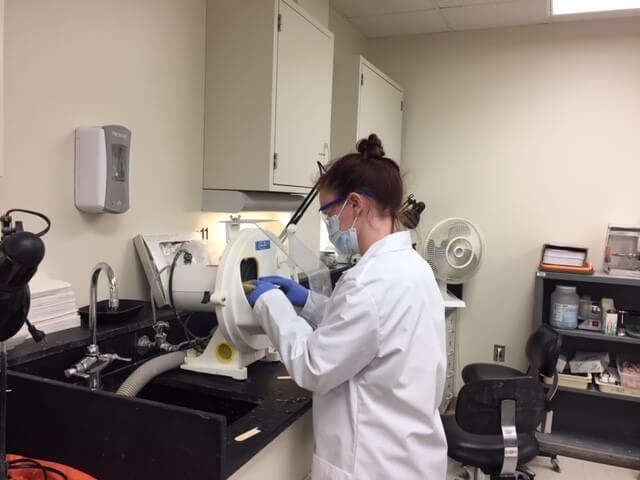
Aug 22, 2020 | College, Industry, STEM
Citing a shortage of dental assistants in New Hampshire and across the nation, Lisa Scott, Dental Assisting Program Coordinator at NHTI, Concord’s Community College, set about to develop an online course in its Dental Assisting Program.
Her efforts have resulted in Dental Assisting Science I, available for the first time this fall for New Hampshire high school juniors and seniors.
“I wanted to create something more accessible to students in the state who would have to drive a long distance to take the course if it wasn’t available online,” she said.
Dental Assisting Science I is part of the Community College System of New Hampshire’s eStart program, which offers courses with a tuition of just $150 plus the cost of books.
Scott said students who complete and pass the course, however, qualify for tuition reimbursement through the Governor’s STEM initiative.
“This is a great opportunity for students who might have an interest in this career pathway, and the cost is very minimal,” she said.
As for the course itself, it is 3-credits, which can be transferred when students are accepted into the dental assisting one-year certificate program, the only one in NH accredited by the Commission on Dental Accreditation.
Subjects covered in Dental Assisting Science I include the anatomy of the head with an emphasis on the osteological landmarks and structures of the oral cavity. Both the permanent and primary dentitions are covered, including embryonic development and eruption patterns, as well as an introduction to the structure and function of the human body systems in health and disease.
She said the course rhetorically answers several questions.
“Did you know every tooth has a name and a number?” she said. “Ever wonder what those bumps are all over your tongue?
Other questions include: Did you know the oral cavity can give us information about diseases in the rest of the body and did you know teeth were part of the digestive system?
“This course is a great way to explore the dental assisting profession as a career option,” said Scott, who said program graduates are able to perform a variety of duties.
“They are qualified to perform all of the expanded duties that are legal in New Hampshire, such as coronal polishing, exposing dental x-rays, placing sealants, monitoring nitrous oxide and other duties,” she said.
According to Scott, who is also a Certified Dental Assistant and Dental Hygienist, the course serves as a gateway to what she describes as “an exciting and rewarding career.”
“As a healthcare provider, dental assistants help patients with good oral health and overall health, and it is a career I have very much enjoyed,” she said.
To learn more about the course, or enroll, contact Scott at lscott@ccsnh.edu or Kelly O’Brien at kobrien@ccsnh.edu.
Program information is also available at https://www.ccsnh.edu/colleges-and-programs/programs-for-high-school-students-to-earn-college-credit/estart/2020-course-schedule.
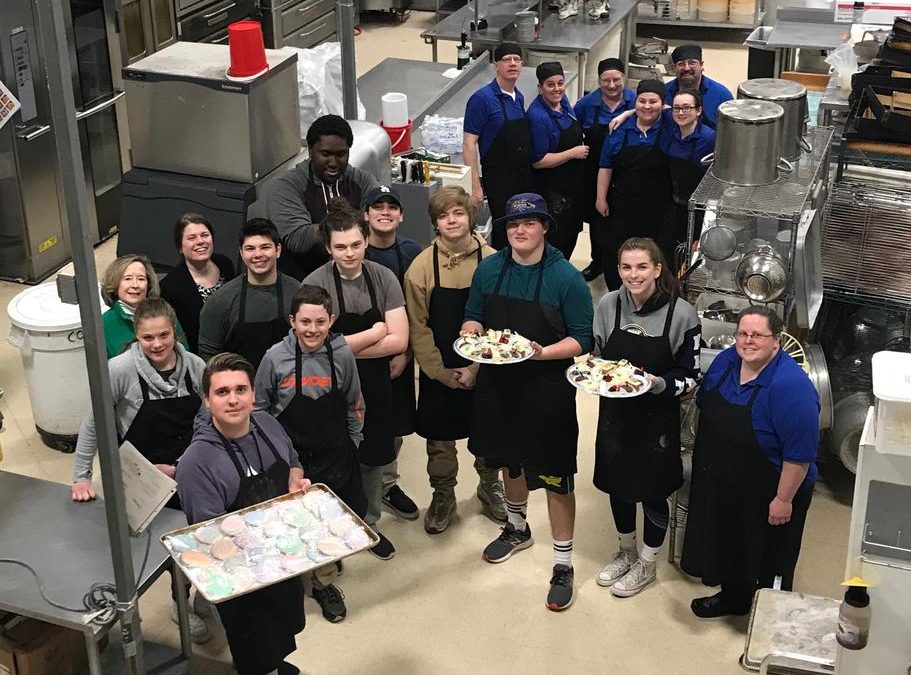
Aug 20, 2020 | Challenges and Opportunities, College
While the continued pandemic presents many unknowns, the New Hampshire Lodging & Restaurant Association (NHLRA) continues to look for opportunities to engage both students and industry.
“The association had to pivot quite a bit to be able to support the hospitality industry to the best of our ability,” said Amie Pariseau, Education and Workforce Development Director.
On the education side of her job, Pariseau said she has been mindful of not wanting to lose her connection with students, many of whom are learning remotely.
“Jumping off the Virtual New Hampshire Hospitality Month idea, I built a YouTube channel called Explore NH Careers, which is also a website with the same name,” she said. “The YouTube channel will be shared with Extended Learning Coordinators, CTE teachers, traditional teachers, VLACS, and community partners, such as Project SEARCH, Girl Scouts, and Girls Inc.”
The content, she said, is varied and includes everything from cooking demonstrations and learning about cuts of beef to industry tours and industry chats.
“It’s a work in progress,” said Pariseau, who noted several industry members “are ready to join in on Zoom chats and demonstrations.”
“I will also be working with the Department of Education to learn about their preferred platform in order to share documents and other tools,” she added.
Regarding her focus on the workforce, Pariseau said she continues to promote the NH Restaurants, Hotels, & Attractions Job Board and connect community partners, such as Veterans Affairs to jobs.
“I just try to support them the best I can through this time,” she said.
According to Pariseau, though, the pandemic has presented NHLRA with a somewhat stark reality.
“In March through June, I lost the opportunity to showcase the industry to middle school and high school students,” she explained.
April had also been set as New Hampshire Hospitality Month in which 500+ students were scheduled to tour properties around the state and learn about the different opportunities and career pathways in the industry.
“I created a YouTube playlist for Virtual New Hampshire Hospitality Month, which I hoped to fill with tours,” said Pariseau. “With the industry trying to survive, it was particularly hard to ask them to participate, though, and so it’s mostly populated with cooking demonstrations.”
On the workforce side, the training NHLRA scheduled in partnership with Granite State College, “Fundamentals of Hospitality Management,” was canceled in the spring.
“With the college only offering programs virtually in the fall, we have decided to forgo this training at this time.,” she noted. “We have been working diligently, however, on sharing training tools through both the National Restaurant Association and American Hotel & Lodging Educational Institute, which have been free or low cost.”
In looking ahead, Pariseau said she and NHLRA will continue to work on finding the best ways to interact with students.
“They are the future generation of this industry,” she said.
Without the ability to get them out to see the industry behind the scenes, talk to people who are passionate about what they do and give them hands on experiences, Pariseau acknowledges she is worried.
“I can’t promote hospitality as a viable career path,” she said. “Virtual learning is a real challenge for me to overcome to be able to promote the industry that drives New Hampshire’s economy, but it is one I am tackling head-on.”
To learn more about NHLRA, or NHLRA’s Hampshire Hospitality Employee Relief Fund which has provided close to $150,000 to hospitality employees impacted by the coronavirus, visit https://www.nhlra.com.

Jun 1, 2020 | Challenges and Opportunities, College, Industry, Programs
For adult learners who want to earn an associate degree in 20 months or certificate in 10 months, the Accelerated Lifelong Learning Program (ALL) at Nashua Community College (NCC) may be for you.
Developed by Samantha Belcourt, CTE and Continuing Education Coordinator, ALL is scheduled to launch in fall 2020 with the following programs:
- Business Administration AS: Management
- Business Administration AS: Small Business Entrepreneurship
- Psychology AA
- Data Analytics Certificate (10 month program)
While the program lays out a fast-track, Belcourt said ALL’s cohort-structured schedule provides a pathway to success for committed students.
“The structured schedule is designed for adults to plan ahead of time and know what to expect for class time and homework,” she said. “It combines online, evening and weekend education to complement a 9 to 5 work schedule. Adult learners can still work while they engage in a full-time college schedule.”
Belcourt said she was inspired by a similar program that helps adult learners in California.
“I learned about it this past fall at a conference with Complete College of America,” she explained. “That program [in California] has had a huge success in this accelerated style. I think many people are looking for this type of fast-paced credential to get them where they want to be.”
With increased economic stressors on individuals and businesses since the health crisis began, Belcourt said that “it’s a good time to have the option of an accelerated degree and certificate pathway.”
“A lot of companies have now laid off employees, and people are not sure yet about their education goals,” she added. “I am hoping people will find this program helpful while unemployed to gain more credentials.”
As for who makes for an ideal candidate for the program, Belcourt cited “motivated students looking to get ahead fast.”
“It’s good for someone who has started some college in the past and wants to return and get their degree at an accelerated pace,” she said. “ALL is also good for high school students who are comfortable with an accelerated pace…For students with the ultimate goal of a bachelor’s degree, ALL also creates a pathway to the Granite State College accelerated bachelor program.”
To learn more about ALL, visit https://www.nashuacc.edu/academics/all.

May 5, 2020 | Industry
In partnership with the New Hampshire Lodging & Restaurant Association Education Foundation, the New Hampshire Lodging & Restaurant Association (NHLRA) recently launched the New Hampshire Hospitality Employee Relief Fund (NNHERF).
The purpose of NNHERF, according to NHLRA’s Amie Pariseau, is to support employees of the hospitality industry who have been impacted by COVID-19.
“We have raised more than $140,000 through the generous donations of the public and our industry and community partners,” she said. “We’ve received donations as small as $25 to as large as $20,000.”
Pariseau cited other fundraising efforts, which include NH Brewing Virtual Beer Fest (May 2), Best of NH (June 18), Gratuity Pale Ale (NH Breweries collaboration) and a NH Liquor Commission Raffle.
“It’s been a wonderful effort by many different groups and people,” she added.
As for how the money is distributed, Pariseau said there are several eligibility requirements. Applicants must: 1) Hold or have held a position in the beverage, food service, or hospitality industry within the last 60 days (from March 16) and 2) Can provide proof of employment within the last 60 days (from March 16).
“Funding is given on a first come, first serve basis to those who complete the application and its requirements as well as meet all eligibility,” she said. “We’re diligently working to provide $250 to as many applicants as possible until the funds are depleted.”
To date, NHLRA has awarded $126,000 to 504 hospitality industry employees.Hospitality industry employees can apply for funding at nhherf.org.
In looking ahead, Pariseau said the NHLRA is “laser-focused” on supporting, advocating, and providing the most up to date information to their members.
“Whether that be through the NHHERF, answering phone calls to provide answers or a kind listening ear, advocating for state and federal funding,updating our COVID-19 resources webpage and sending weekly,sometimes daily, emails,” she added.
Pariseau said NHLRA President/CEO Mike Somers is also on the Governor’s Economic Re-Opening Task Force.
“He is helping to work on strategies and plans to reopen the hospitality industry safely and effectively for employers, employees, and customers alike,” she said. “NHLRA is committed to getting this state working again.
For more information about NHLRA, visit https://www.nhlra.com.
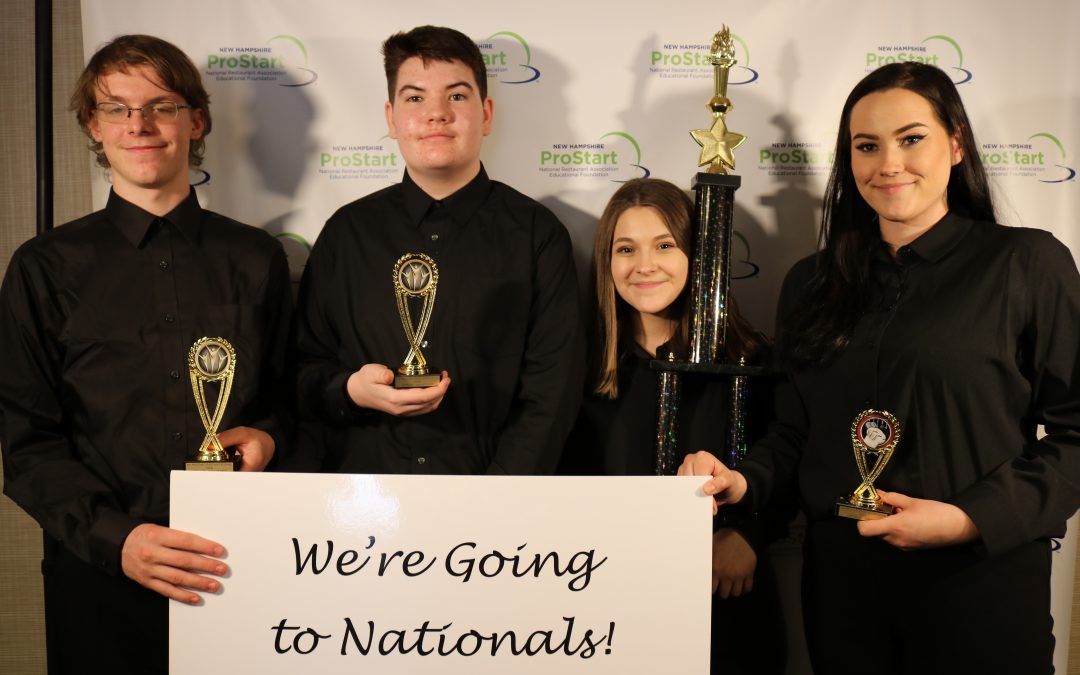
Apr 21, 2020 | Achievements, Hospitality, Students
In March, dozens of students came together to compete in the categories of Culinary and Management at the New Hampshire ProStart State Invitational.
Mount Washington Valley Career & Technical Center (MWVCTC) won in the Culinary category while Pinkerton Academy took first in Management.
According to Amie Pariseau of the New Hampshire Lodging & Restaurant Association (NHLRA), however, the story is not going to continue in the way everyone expected.
“Our first place winners were invited to compete at the National ProStart Invitational in Washington D.C. in May, but COVID-19 forced the cancellation of the regional and national invitational events,” she said.
All is not lost, though, noted Pariseau, who cited several rewards for the student.
“The National Restaurant Association Education Foundation will be providing a gift card worth $150 to each state’s first place culinary arts and restaurant management team members,” she said. The foundation will also be offering a $1,500 scholarship to the 2020 graduating ProStart seniors on each state’s winning teams.”
Acknowledging NHLRA shares in the disappointment of the teachers and their students in not being able to experience the Nationals and visit D.C., Pariseau said it does not lessen the students’ achievements.
“NHLRA is working with both schools of the winning teams to provide a way to celebrate their accomplishment with their team and families in some way this summer,” she said. “We’re very proud of them and want to recognize them for their commitment and dedication.”
This commitment and dedication, she said, led to “impressive performances at the ProStart State Invitational.
Kaylee, Jaime, Riley, Tristan and Sierra from MWVCTC created a menu that featured: an appetizer of crispy calamari and lemon served with harissa aioli and chermoula oil; an entrée of moroccan rubbed rack of lamb with pomegranate reduction, lemon-cilantro vinaigrette tossed with rainbow fingerlings, and sautéed vegetable hash; and a dessert of vanilla bean panna cotta served with grapefruit and brown sugar caramel and topped with spiced pistachios.
“They executed this high-level menu in 60 minutes using only two butane burners, no running water, and no electricity,” said Pariseau. “That’s incredible. We were very fortunate to have executive-level and ACF certified chefs as judges, all of whom said the caliber of the menus and the execution by our ProStart students was outstanding.”
In the management category, Pariseau said John, Lily, Angelina, and Matthew from Pinkerton Academy designed Wild Bamboo, an Asian restaurant devoted to the environment and sustainability.
Their menu featured a dumpling soup, bibimap (a Korean rice dish topped with beef sautéed vegetables and a fried egg), duck (statler duck breast seared with the skin on, paired with bamboo rice and a tat soi-mushroom sauce, beef (sliced flank steak sautéed with onions, served with a side of fresh vegetable), and a steam cake.
“The judges were highly impressed by their QR coupon code and the website they designed from scratch,” she said. “We were fortunate to have judges from all facets of the industry. Many of them were ready to hire our very talented students on the spot based on their ideas, creativity and presentation skills.”
Pariseau said competing students will also receive a variety of scholarships from Great Bay Community College, Lakes Region Community College, NHTI, White Mountains Community College, Johnson & Wales University and the Culinary Institute of America.
“Despite COVID-19, there are a lot of positive takeaways for the future from this year’s ProStart State Invitiatonal,” added Pariseau.
To learn more about ProStart, visit https://www.nhlra.com/nhprostart.html.

Mar 2, 2020 | Achievements, Awards, CTE Promotion, Programs, Value
In 2019, Bruce Farr, Principal of Lakes Region Technical Center (LRTC), received the 2019 NHCTE Service Award, a recognition that underscores for him the importance of Career and Technical Education (CTE) itself.
“Everyone needs a balanced education,” he said. “Public education must provide our young people with an appreciation for the arts, academic skills, civic engagement and job skills.”
This need, he said, has always been top of mind for him.
“Growing up in rural New Hampshire, I witnessed the effect of not having the skills to be successfully employed and the benefits of having valued skills in the workplace,” he said.
For Farr, who has more than 45 years experience in CTE, a continuing issue is that the general public still does not know about this educational arm in the state.
“In many ways, CTE continues to be an unseen ‘jewel’ of public education,” he explained. “Those who have been enrolled in CTE programs or have volunteered in those programs clearly appreciate CTE. However, many of our citizens do not know the opportunities for our students.”
Noting he is personally and professional humbled at receiving the 2019 NHCTE Service Award, Farr expressed particular enthusiasm in his role at helping to modernize NH’s Alternative 4 (Alt 4) program.
“It is a customized process whereby candidates who are highly successful in their field, but lack the traditional formal 4-year teacher preparation degree, are better supported during the certification process,” he said.
The need for Alt 4, he said, cannot be overemphasized.
“A CTE instructor must not only have the ability to successfully teach young people, but they also need extensive firsthand knowledge of their trade/industry,” said Farr. “We have candidates who are willing to make that mid career change and we need to support them.”
He described Alt 4 as an “on-ramp for highly qualified people to enter the field.”
“Each individual’s skills are examined and compared to the state teacher competencies, which results in a plan that can be developed to assist him or her acquire those missing skills,” he said. “It’s a terrific program.”
In looking ahead for CTE and LRTC, Farr said he is excited that at the development of a more seamless transition from high school to either direct job placement or post-secondary school.
“The expansion of CTE to include a rigorous senior year where a student can be enrolled in college, intern in several businesses or start an apprenticeship will support this, too,” he added.
To learn more about LRTC, visit https://www.lakesregiontechcenter.org.

Feb 11, 2020 | Industry
On April 2, large crowds are expected at the Omni Mount Washington Resort for the 90th annual convention of the Granite State Association of FFA, an event that serves multiple purposes.
“It is the culmination of the FFA year for our students, a chance for them to come together and test their skills against others with similar interests and abilities,” said Executive Director Maria VanderWoude.
At the convention, students will also be recognized for their work throughout the year in both agriculture and FFA. Prior to the convention, applications are submitted for judging in more than 40 skill areas, including everything from various leadership areas to veterinary science, specialty animal production, wildlife management, agricultural mechanics, vegetable production, floriculture and others
“We also award scholarships and recognize students for things like community service, personal growth and outstanding leadership,” said VanderWoude.
Five general sessions are held at the convention, which are run by student state officers.
“Awards are given, guests speak and the energy is high,” she said.
In addition to competitions and awards, the convention features leadership development workshops and a careers symposium in which folks from industry come in to talk with students.
“Last year, both Commissioner Jasper and Commissioner Edelblut were in attendance, so hopefully they’ll both be back this year,” VanderWoude said.
The convention also features a chance for students to unwind.
“Social activities in the evenings give teens a chance to put away their phones and interact with their peers,” she said.
According toVanderWoude, one of the things she likes best about the FFA convention is that it is run by students.
“No adult is on stage unless invited there by the FFA members,” she said.
As for FFA itself, it officially morphed in 1988 from “The Future Farmers of America” to “The National FFA Organization” to reflect the science, technology and business of agriculture. Today, FFA currently serves about 500 students in 12 schools across NH.
“I want folks to understand that FFA is primarily a leadership development organization,” said VanderWoude. “Students must be enrolled in agricultural education classes in order to join FFA, but agriculture is a very wide field with over 300 careers.”
Most schools in NH, she noted, focus on small animal science, horticulture and natural resources along with a variety of other topics.
“FFA is a fantastic vehicle for developing leaders,” she said.
For VanderWoude, the convention best captures the essence of FFA.
“There is so much positive energy and excitement at the convention,” she said. “Each session opens with the state officers running on stage, usually through a human tunnel made by their peers in the audience. The energy is high and the atmosphere is wholesome and accepting. It restores one’s faith in youth.”
To learn more about the convention or Granite State Association of FFA, visit https://www.nhffa.org.










